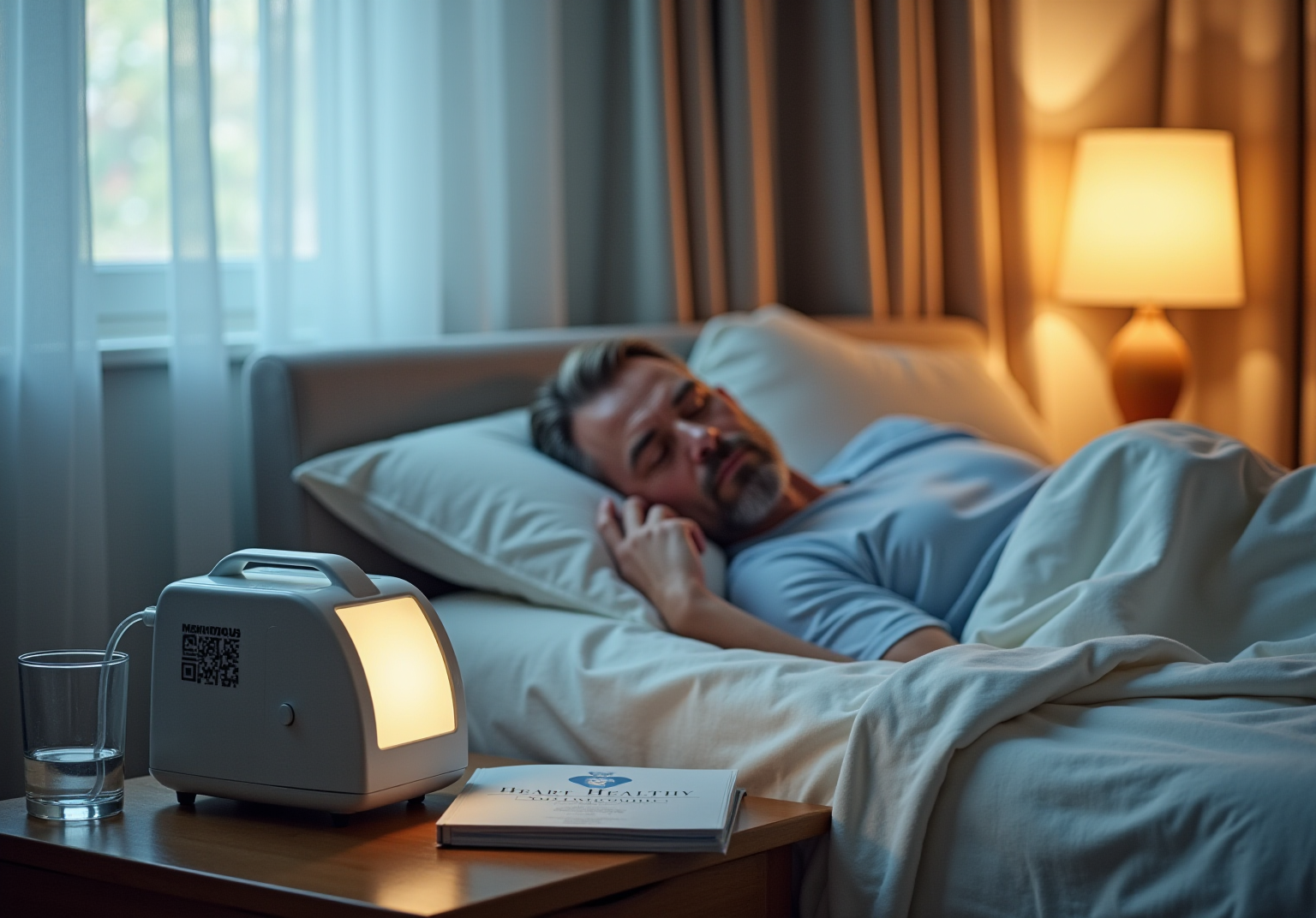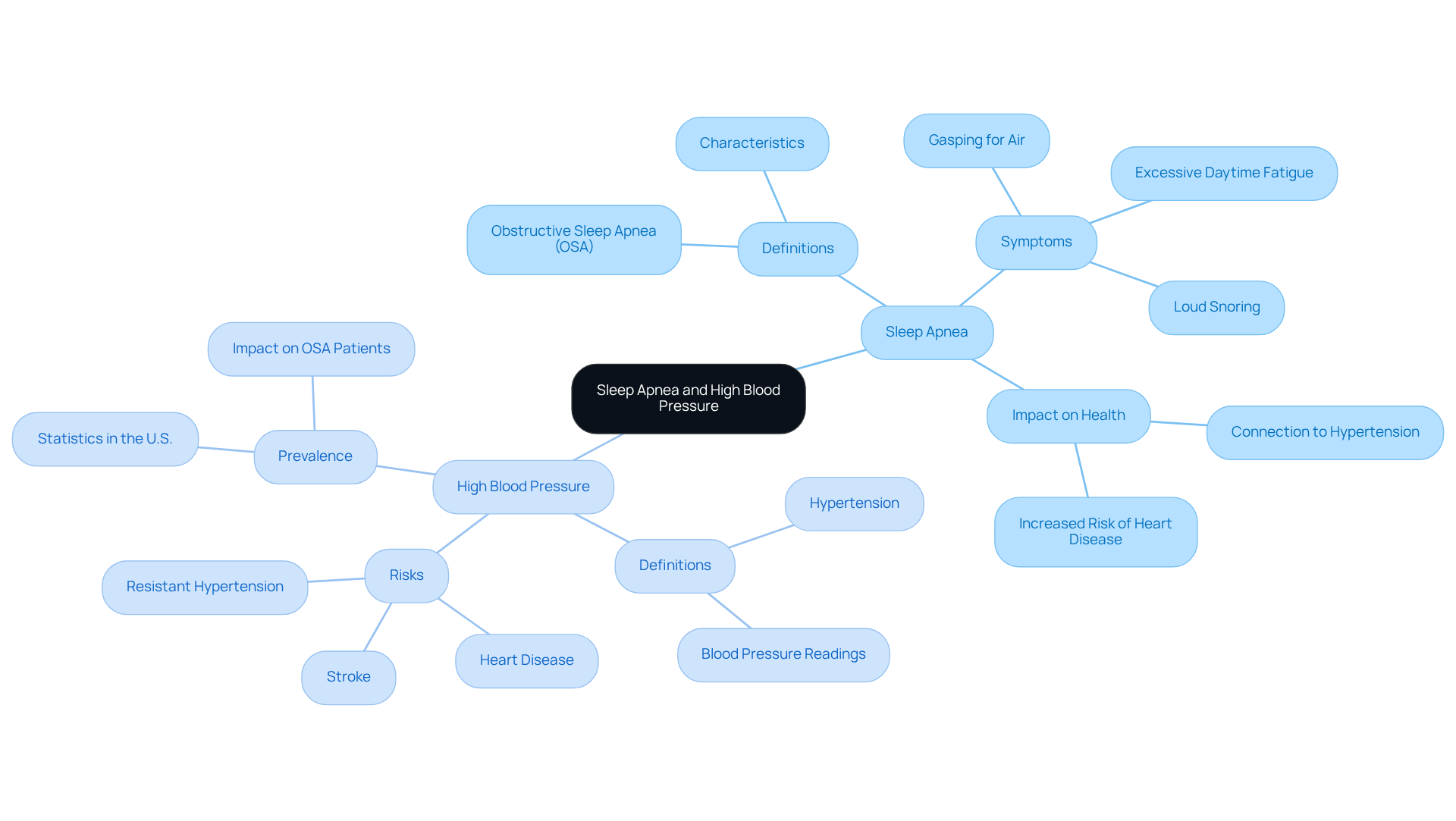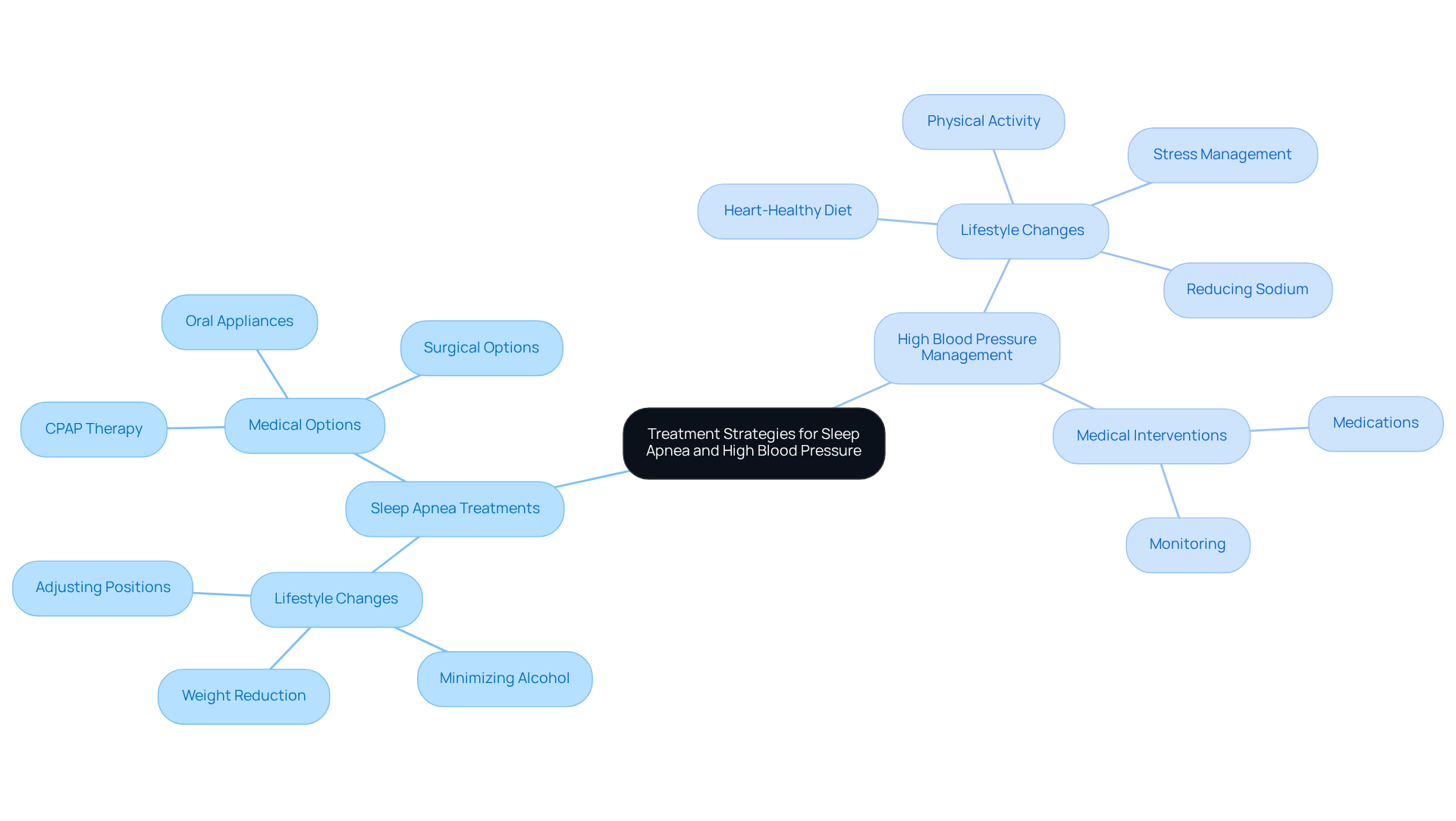


The article highlights the important connection between sleep apnea and high blood pressure, shedding light on how sleep apnea can worsen hypertension and complicate its management. Many individuals may be unaware of this link, which can be concerning. Understanding the physiological mechanisms that connect these conditions is crucial for effective care.
Did you know that both sleep apnea and hypertension are prevalent among Americans? This reality underscores the need for early diagnosis and effective treatment strategies. For instance, CPAP therapy has been shown to significantly improve cardiovascular health, offering hope and relief to those affected.
It is essential to address these health concerns with compassion and understanding. By recognizing the symptoms and seeking appropriate treatment, individuals can take proactive steps toward better health. Remember, you are not alone in this journey; support is available, and reaching out for help is a positive step forward.
Understanding the intricate relationship between sleep apnea and high blood pressure is crucial, as both conditions significantly impact millions of lives. Sleep apnea, characterized by intermittent breathing disruptions during sleep, often goes hand-in-hand with hypertension, creating a cycle that can lead to serious cardiovascular complications.
As we explore this connection, it’s important to consider: how can individuals effectively manage their health when faced with the dual challenges of sleep apnea and high blood pressure? This question resonates deeply, especially for those who may feel overwhelmed by their health issues.
This article delves into essential insights, risk factors, and treatment strategies that can empower individuals to take control of their well-being. By understanding these aspects, you can feel more confident in your journey toward better health, knowing that support and solutions are within reach.
Obstructive breathing is a significant disorder that can deeply affect your quality of life. It is characterized by repeated disruptions in respiration during rest, lasting from a few seconds to several minutes, and can occur 30 times or more each hour. The most common type is obstructive apnea (OSA), where excessive relaxation of the throat muscles blocks the airway. If you or a loved one experiences loud snoring, gasping for air during rest, or excessive daytime fatigue, it’s essential to seek help.
Hypertension, or high blood pressure, is another serious condition defined by consistently elevated readings of 130/80 mm Hg or higher. This condition can pose significant health risks, including heart disease and stroke, often termed a silent killer due to its lack of noticeable symptoms. Recent studies suggest that sleep apnea and high blood pressure impact roughly 22 million Americans, with a notable occurrence among individuals with hypertension, affecting 30 to 40 percent of this group. Furthermore, individuals with severe sleep apnea and high blood pressure are three times more likely to experience resistant hypertension, highlighting the critical connection between these two conditions.
At Amavita Heart and Vascular Health, we recognize the importance of specialized cardiovascular treatment for high-risk patients, particularly older adults facing issues such as sleep apnea and high blood pressure during rest. Our advanced imaging capabilities are designed to provide comprehensive evaluations, ensuring personalized approaches to your cardiovascular health. It’s important to note that ongoing respiratory issues during childhood can increase the risk of developing hypertension in adolescence, highlighting the need for early identification and intervention.
By addressing breathing interruptions during rest, we not only enhance your quality of rest but also play a crucial role in regulating vascular levels, potentially lowering the chances of heart-related issues. Remember, you are not alone in this journey; we are here to support you every step of the way. If you have concerns about your breathing or blood pressure, please reach out to us. Together, we can work towards a healthier future.

The physiological connection between sleep apnea and high blood pressure is primarily driven by repeated episodes of hypoxia, or low oxygen levels, that occur during apneic events. When respiration stops, oxygen levels drop, prompting heightened sympathetic nervous system activity, which raises heart rate and circulatory force. Frequent awakenings throughout the night further contribute to a sustained rise in blood pressure during the day.
Have you ever wondered how your sleep might be affecting your heart health? Research shows that almost 30 to 40 percent of individuals with sleep apnea and high blood pressure also experience obstructive nighttime breathing disorders. Untreated instances of these disorders can greatly heighten the risk of developing resistant hypertension, especially when linked to sleep apnea and high blood pressure, a condition that can be particularly challenging to manage with conventional treatments. A study examining data from 284 participants discovered that 58% of those with severe obstructive respiratory issues experienced resistant hypertension, compared to 28% with moderate cases. This emphasizes the essential requirement for efficient management of breathing disorders to enhance circulation regulation and overall heart health.
At Amavita Heart and Vascular Health, our experts are dedicated to helping you navigate these challenges. We employ advanced diagnostic imaging to detect underlying cardiovascular problems that may be worsened by disrupted nighttime breathing. We cater to high-risk patients, including those with diabetes, hypertension, or a family history of heart disease.
As Dr. Harneet Walia noted, 'Even under the close care of a cardiologist following national guidelines for treatment of cardiovascular risk, severe levels of sleep apnea and high blood pressure appear to be contributing to suboptimal blood pressure control.' This highlights the significance of tackling sleep issues not only for improved quality of rest but also for enhancing cardiovascular outcomes. Our tailored treatment plans and innovative, minimally invasive procedures often allow for same-day discharge, ensuring you receive the care you need without unnecessary delays.
Remember, you are not alone in this journey. We are here to support you every step of the way.

Common risk factors for this condition include:
In addition to this, lifestyle choices such as:
can further increase the risk. Elevated hypertension shares several of these risk factors, including:
It is often associated with sleep apnea and high blood pressure. Significantly, nearly half of adults in the United States experience increased arterial tension, emphasizing the importance of addressing health concerns such as sleep apnea and high blood pressure.
Recent research indicates that children with obstructive respiratory issues are almost three times more likely to develop hypertension during their teenage years compared to their peers without the condition. This finding underscores the necessity for early intervention and treatment. Furthermore, the application of positive airway pressure (PAP) therapy has shown a notable decrease in arterial tension for individuals suffering from sleep apnea and high blood pressure, with an average decline of approximately 4 points in systolic measurement and over 2 points in diastolic measurement. Dr. Harneet Kaur Walia, medical director of rest medicine at Baptist Health Miami Cardiac & Vascular Institute, emphasizes that 'lowering blood pressure by even a little can save lives,' which highlights the critical role of PAP therapy in managing sleep apnea and high blood pressure.
Health professionals stress that obesity significantly impacts sleep-related issues, with one expert noting that addressing weight management can lead to considerable improvements in sleep quality and overall well-being. Moreover, around 10% of school-aged children experience obstructive breathing disturbances, further emphasizing the need for awareness and early intervention. By recognizing and addressing risk factors like sleep apnea and high blood pressure, individuals can take proactive steps toward better heart health and an improved quality of life. Remember, you are not alone in this journey, and there are effective ways to support your health.

Diagnosing sleep disorders can be concerning, but understanding the process can help ease your worries. Polysomnography, a comprehensive study of sleep, examines various physiological parameters such as breathing patterns, oxygen saturation, and heart rate throughout the night. This method is considered the gold standard for accurate diagnosis. However, we also recognize that convenience matters, which is why home testing for breathing disorders (HSAT) has become a popular alternative, allowing you to be assessed in the comfort of your own home. Recent advancements in HSAT technology have made these tests more accessible and effective, providing reliable results for many individuals.
At Amavita Heart and Vascular Health, we understand that high-risk patients, such as those with sleep apnea and high blood pressure, diabetes, hypertension, or a family history of heart disease, require specialized cardiovascular care. Our advanced imaging capabilities are essential for diagnosing and managing conditions such as sleep apnea and high blood pressure. For hypertension, we determine diagnosis through regular blood pressure measurements, typically using a sphygmomanometer. If your readings are consistently at or above 130/80 mm Hg, a diagnosis of high blood pressure is confirmed. Sometimes, additional evaluations are necessary to uncover any underlying causes or complications associated with hypertension, ensuring a thorough and compassionate approach to your care.
It’s important to remember that unmanaged nocturnal breathing issues, including sleep apnea and high blood pressure, can exacerbate hypertension and lead to further cardiovascular problems. Observations from specialists in sleep medicine highlight the significance of precise testing techniques in addressing these concerns. With Dr. Martinez-Clark's extensive cardiovascular experience, you can trust that these sophisticated tests will be seamlessly integrated into your comprehensive care plan. At Amavita, we are committed to delivering cardiovascular care that truly prioritizes your well-being and goes beyond what is typically available at other practices. We are here to support you every step of the way.

If you or a loved one struggles with nighttime breathing disturbances, know that there are compassionate solutions available. Often, successful therapy begins with simple lifestyle changes, such as:
One of the most effective treatments for moderate to severe obstructive respiratory issues is Continuous Positive Airway Pressure (CPAP) therapy, which helps keep your airway open during rest. In some cases, your healthcare provider may also suggest oral appliances or even surgical options. Importantly, studies have shown that CPAP therapy can lower cardiovascular risks by 17% in high-risk patients with obstructive sleep apnea (OSA), highlighting its critical role in managing sleep apnea and high blood pressure.
Managing elevated blood pressure also relies on making thoughtful lifestyle adjustments. Consider adopting a heart-healthy diet, such as the DASH diet, engaging in regular physical activity, reducing sodium intake, and finding effective ways to manage stress. Dr. Harneet Kaur Walia emphasizes that even small improvements in circulation can lead to significant long-term health benefits. In some cases, medications may be prescribed to help lower vascular tension, and regular monitoring is crucial to ensure that your management plan is effective.
Combining therapies for both sleep apnea and high blood pressure can greatly enhance your overall health. Research indicates that patients using CPAP treatment often experience notable reductions in blood pressure—averaging a decrease of about 4 points in systolic pressure and over 2 points in diastolic pressure. This dual approach not only improves sleep quality but also contributes to better cardiovascular health.
However, it’s essential to remember that treating sleep apnea alone cannot replace the importance of healthy lifestyle choices. Some patients may encounter challenges with CPAP therapy, such as discomfort or the need for adjustments. If you have concerns or questions, don’t hesitate to reach out for support. You’re not alone in this journey, and there are caring professionals ready to help you find the best path to better health.

Understanding the intricate relationship between sleep apnea and high blood pressure is essential for improving your overall health. These conditions are interconnected, with sleep apnea significantly contributing to hypertension and other cardiovascular issues. By addressing these disorders, you not only enhance your sleep quality but also play a pivotal role in managing your blood pressure levels, ultimately leading to a healthier life.
This article highlights several key points:
It emphasizes the importance of early intervention and lifestyle changes, such as weight management and dietary adjustments, to mitigate the risks associated with these conditions. Furthermore, it underscores the effectiveness of therapies like CPAP in improving outcomes for both sleep apnea and hypertension.
Taking proactive steps toward recognizing and treating sleep apnea and high blood pressure can lead to significant improvements in your cardiovascular health. We encourage you to consult healthcare professionals for personalized treatment plans and to engage in lifestyle modifications that promote better sleep and heart health. By prioritizing these aspects, a path toward a healthier future is within your reach.
What is sleep apnea and how does it affect quality of life?
Sleep apnea is a disorder characterized by repeated disruptions in breathing during sleep, which can last from a few seconds to several minutes, occurring 30 times or more each hour. The most common type is obstructive sleep apnea (OSA), where relaxation of throat muscles blocks the airway. Symptoms include loud snoring, gasping for air during sleep, and excessive daytime fatigue.
What is hypertension and why is it considered a serious condition?
Hypertension, or high blood pressure, is defined by consistently elevated readings of 130/80 mm Hg or higher. It poses significant health risks, including heart disease and stroke, and is often referred to as a silent killer due to its lack of noticeable symptoms.
How prevalent are sleep apnea and high blood pressure in the U.S.?
Approximately 22 million Americans are affected by sleep apnea and high blood pressure. Among individuals with hypertension, 30 to 40 percent also experience sleep apnea, indicating a notable connection between the two conditions.
What is the connection between sleep apnea and resistant hypertension?
Individuals with severe sleep apnea are three times more likely to experience resistant hypertension, which is hypertension that is difficult to manage with conventional treatments. The link is primarily due to repeated episodes of low oxygen levels during apneic events, which raise heart rate and blood pressure.
How can childhood respiratory issues impact future health?
Ongoing respiratory issues during childhood can increase the risk of developing hypertension in adolescence, underscoring the importance of early identification and intervention for breathing disorders.
What role does Amavita Heart and Vascular Health play in managing these conditions?
Amavita Heart and Vascular Health specializes in treating high-risk patients, particularly older adults with sleep apnea and high blood pressure. They offer advanced imaging capabilities for comprehensive evaluations and personalized treatment approaches.
How does sleep apnea affect heart health?
Sleep apnea can lead to repeated episodes of hypoxia, increasing sympathetic nervous system activity, which raises heart rate and blood pressure. Frequent awakenings during the night can also contribute to sustained high blood pressure during the day.
What should individuals do if they have concerns about sleep apnea or high blood pressure?
Individuals experiencing symptoms of sleep apnea or high blood pressure should seek help from healthcare professionals. Amavita Heart and Vascular Health encourages patients to reach out for support and work towards a healthier future.